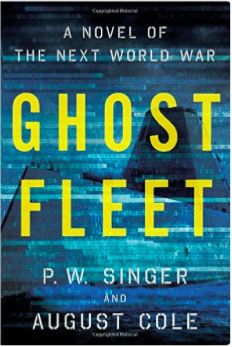I’ve read a lot of Tom Clancy over the years (his actual novels, not those books where his name was just added to the cover to encourage sales), and there are probably hundreds of reasons for his popularity — well-researched military hardware, believable heroes and villains, and descriptive battles are just a few I believe led to Clancy’s success in military fiction. His novels are almost unique in their style, but I’ve recently finished a new novel that had me flashing back to one of my favorite Clancy novels – Clear and Present Danger.
With Clear and Present Danger, Clancy bounced between dozens of locales and individuals, never spending more than a few pages or so on any one place before moving to another. The thick book just felt like it read faster with all those jumps in the action. I never had time to catch my breath, and Clancy left plenty of cliffhangers that wouldn’t be resolved for dozens of pages as you raced to get back to your favorite character or scene. Clancy used this method in many of his novels, and the incredible amount of detail he could squeeze into short sections to explain a missile’s development or a certain rifle’s accuracy was what kept me racing to the bookstore when a new Clancy novel was released. Tom Clancy died in 2013, and fans around the world mourned the loss.
I didn’t think anyone could recreate the storytelling method used by Clancy without coming off as just trying to be the next Clancy… but I was wrong. It took TWO people to find a unique story that could use Clancy’s short, fast-paced sections. And best of all, the story doesn’t read like a novel trying to be Clancy.
Ghost Fleet is written by Peter Singer and August Cole. Singer is a military trends researcher and Cole covered the defense industry for the Wall Street Journal. Their backgrounds are obvious when the major plot of Ghost Fleet is considered — China has decided to make a pre-emptive strike against the US and some of its allies in a non-nuclear engagement, and the strike happens fast and with almost zero resistance due to the USA’s dependency on technologies manufactured in China. The story takes place just a few years from now, where some new technologies that favor Google Glass or Microsoft’s new HoloLens have become the standard and a growing demand for energy (especially natural gas) have forced China to occupy Hawaii so it can increase its control on the seas.
It may sound far-fetched, but Singer and Cole’s novel has gotten some real attention in Washington, DC. Singer has been giving talks to military leaders about many of the problems the fictional US in their novel faces… and how those problems compare to the real USA.
The story moves back and forth between occupied Hawaii and individuals working to fight the Chinese military with new technology and old technology… plus one unique individual who uses an old loophole in the Constitution regarding the hiring of privateers. Readers will discover many modern-day headlines playing out in this novel — Chinese hacker colleges, weaponized drones, over-reliance on GPS, and much more. And just when you start thinking the authors have used creative license to make too large of a jump in creating (or resolving) a plot device, be sure to jump to the end of the book where you’ll find detailed endnotes that will, more often that not, show you that the tech you thought was fiction is anything but. It’s an amazing list of references the authors used to support their highly technical story of the next world war.
There are some chilling scenarios (again, supported by documented research) in Ghost Fleet that will make you raise an eyebrow and squirm a bit in your seat as you consider just how deep in China’s back pocket the USA has become in terms of debt and manufacturing. The story may be fiction, but you’ll listen a little closer the next time Chinese hackers are blamed for a break-in at a US facility or company or you hear news of military cuts in personnel and mothballing of ships and aircraft due to budget cuts. Let’s hope this story remains in the Fiction section never moves to the History shelf.




